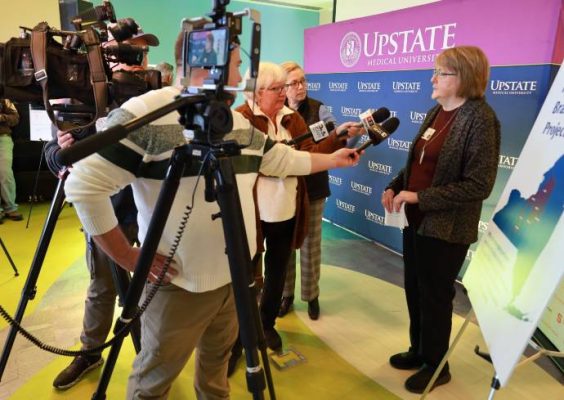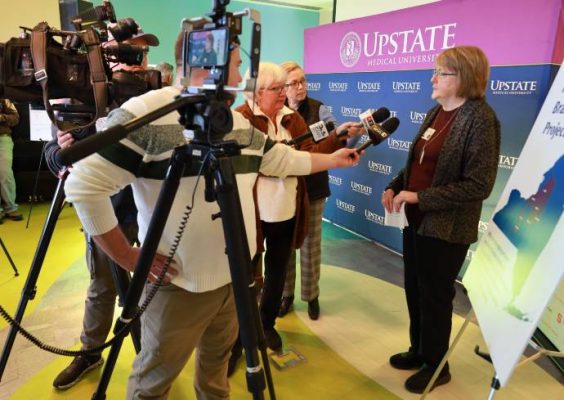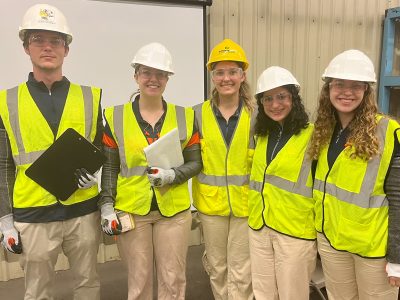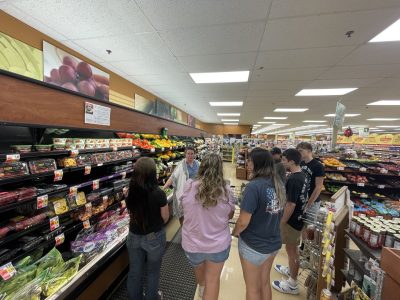Syracuse University, Upstate Collaborate to Bring Memory Screenings to Area Offices for the Aging
Residents over the age of 60 in seven Central New York counties—Cayuga, Herkimer, Lewis, Madison, Oneida, Oswego and Tompkins—can receive free memory screenings from their local Office for the Aging (OFA) as part of a collaborative project between SUNY Upstate Medical University and Syracuse University to assess the benefits of this type of screening in this setting.
The project is the first step in a plan that could possibly make such screenings available at OFAs across New York.
Early recognition of memory changes that could indicate an early stage dementia is important in order to help older adults gets the medical attention they need to avoid a crisis.
“If we are aware of early signs of memory issues, we are able to connect the individual to health care professionals who can begin appropriate treatment, while taking steps to educate and support families to improve the individual’s quality of life,” says Sharon Brangman, MD, SUNY Distinguished Service Professor and chair of the Geriatrics and director of the Center of Excellence for Alzheimer’s Disease. “The ability to easily screen this segment of the population has the potential to significantly benefit both the individual and their families.”
Changes that might be caused by early dementia can include changes in memory, depression, anxiety, aggression or lack of interest, Brangman says.
Here’s how the program works: OFA case managers in the selected counties have been trained by Upstate staff to administer what is called the “Mini-Cog,” a three-minute screening tool to assess potential memory loss. The screening can be administered in an individual’s home during a routine visit by OFA staff or at the county office. OFA case managers will not make any diagnoses based on the screening results; they will only administer the screening.
If the Mini-Cog shows any sign of memory change, the individual will be referred to Upstate University Geriatricians for a comprehensive geriatric assessment.

To evaluate the merits of this screening approach in community settings, Maria Brown, Ph.D., associate research professor in Syracuse University’s David B. Falk College of Sport and Human Dynamics and Aging Studies Institute, will analyze screening information over the yearlong project to identify the number of clients screened, number of clients with scores indicating memory changes, number of clients who receive follow-up comprehensive assessments and their diagnostic results.
“We are excited about improving the ability of OFAs to identify older adults across the Central New York region who could benefit from geriatric evaluations and connection to services to address their changing needs,” Brown says.
Officials say they expect to screen about 3,750 individuals. Based on statistical analysis, they project that about 975 of those individuals will have scores suggesting some memory concerns.
If results of the evaluation show this screening approach with OFA to be a success, Upstate will create an online training manual and companion videos for use by the New York State Office for the Aging that could be included in the training of OFA staff throughout New York. The training resource also has the potential to be used by Offices for the Aging nationwide that have similar missions, programs and staffing.
In an earlier Upstate/Syracuse University pilot program that looked at Onondaga County residents, Brown found that over a nine-month screening phase, 18 (26%) of the 69 mostly African American adults over the age of 65 who were screened had scores suggesting cognitive impairment.
Project officials say OFAs are appropriate entities to participate in this project as they already conduct standard assessments for clients. Called COMPASS, for Comprehensive Assessment for Aging Network Community Based Long Term Care Services, this assessment addresses issues such as housing, nutrition, psycho-social status, medications, daily activities, support network and health, but it does not currently screen for memory issues.
“Early detection of a memory problem such as dementia is vital for timely medical intervention and, just as importantly, to begin connecting individuals and families to the many community-based supports available through local offices for the aging,” says Greg Olsen G’94, the New York state director of the Office for the Aging.
“These offices for the aging are ideally suited to support detection efforts because of their experience assessing individuals holistically, screening for targeted areas of concern, and delivering on the services and supports necessary to help a person age in place, whether it’s case management, home adaptations, personal care supports, nutrition, or other programs. I applaud SUNY Upstate’s Department of Geriatrics and Syracuse University’s Aging Studies Institute for this innovative collaborative effort with offices for the aging in their region.”
It’s noteworthy that Upstate and Syracuse University have joined forces to address this issue. The Upstate/Syracuse collaboration leverages significant resources and expertise on aging issues. Upstate is home to a Department of Geriatrics and a state Center of Excellence for Alzheimer’s Disease (CEAD). CEAD currently has a staff that includes geriatricians who work in conjunction with geriatric nurse practitioners, social workers, and nurses with expertise in geriatrics. Social workers provide caregiver support with a particular emphasis on older adults at risk, especially those who live alone or with frail caregivers.
Syracuse University is home to the Aging Studies Institute, which includes dozens of faculty working on age-related research and education issues, including age-based public policy; the causes and consequences of population aging; health and functioning across the life course; family, care work, and intergenerational support; and aging design, engineering, and technology.
Funding for the Upstate/Syracuse collaboration was made possible by the New York Health Foundation and the Health Foundation for Western and Central New York.
“The Health Foundation is proud to support this important initiative as part of our ongoing work on behalf of older adults,” says Nora OBrien-Suric, Ph.D., president of the Health Foundation for Western and Central New York. “This program will break down barriers to bring earlier screening for memory issues to more people, meaning they’ll have the resources and treatments they need and deserve. Because those barriers to access often occur in communities of color or among people with lower incomes, this is a crucial health equity effort as well.”



